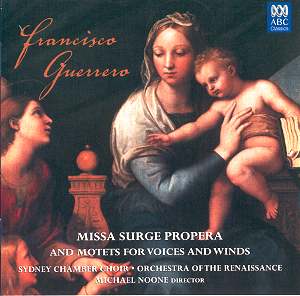Francisco Guerrero
was the Spanish Golden Age composer
who stayed at home. Morales - with whom
Guerrero studied in 1545 or 1546 - spent
ten years serving in the Papal choir
and Victoria spent much of his working
life in Rome. But Guerrero seems to
have been able to resist the Papal City’s
siren call; he paid visits but never
worked there. At the age of sixty he
even visited Jerusalem and wrote a best-selling
account of his travels.
Guerrero started young;
Morales recommended the 18 year old
Guerrero for the post of Maestro
di Capilla at Jaen Cathedral. But
he left after a few years, unable to
cope with the daily grind of extra-musical
tasks, including looking after the singing
boys. By the age of 23 he was assistant
to Pedro Fernandez at Seville Cathedral,
finally took over from Fernandez in
1574 and there he stayed.
His first book of motets
was produced in Seville in 1555. His
first book of Magnificats, dedicated
to King Philip II, was published in
Louvain in 1563. Then in the 1580s his
reputation was enhanced by five major
collections of his music published in
Rome, Paris, Madrid and Venice.
He wrote a small number
of secular works but is best known nowadays
for his nineteen masses, first published
in two volumes; volume 1 in Paris in
1566 and volume 2 in Rome in 1582. Guerrero
travelled to Rome to oversee the typesetting
of volume 2 and it was on this journey
that he made contact with Victoria.
The six voice Missa
Surge propera was chosen by Guerrero
to head the collection. It is based
on a motet by an as yet unidentified
composer; Guerrero’s own Surge propera
motet does not form the basis for the
mass and in fact dates from 25 years
earlier. The motet was included in his
first book of motets.
This 1998 recording
includes both the mass and the motet
(this latter in an instrumental version)
as well as a selection of Guerrero’s
other motets - Tota Pulchra est
(published in Venice in 1570), Regina
Coeli (published in 1584), an eight-voiced
setting which draws on the traditional
plainsong melody, Ave Virgo sanctissima
(first published in 1566 and republished
in 1570 and 1597), one of Guerrero’s
most popular motets, and In exitu
Israel.
The twenty voice Sydney
Chamber Choir are a versatile group
whose repertoire ranges from 12th
century to contemporary. They adapt
themselves very well to the needs of
performing music from the Spanish Baroque.
It helps of course that Michael Noone
has made something of a speciality of
the music of this era.
The choir makes a warm,
attractive sound but, as recorded on
this disc, comes over as an ensemble
of individual voices rather than a smooth
choral group. This is of course no bad
thing; styles of performance have changed
since the Tallis Scholars first started
recording this type of repertoire. Nowadays
there are many groups who sing baroque
polyphony in small groups with a feel
of individual voices singing with great
intensity and that approach works very
well.
Unfortunately, for
me, the sound that the Sydney Chamber
Choir makes does not work here. Perhaps
they were recorded slightly too closely
allowing some rather individual voices
to dominate. It does not help that a
number of the singers, though singing
musically, have a tendency to place
a bulge on each note to the detriment
of the sense of line.
It was this sense of
line that I felt was lacking. Even a
piece as copper-bottomed as Ave Virgo
Sanctissima fails to make you tingle.
What we are left with is some very creditable
performances of some extremely interesting
music. You may be less disturbed by
the choral sound than I and if you are
keen to acquire this Guerrero mass then
I can recommend the disc.
Some of the motets
and sections of the mass are accompanied
by members of the Orchestra of the Renaissance.
This is a standard baroque practice
and makes for interesting listening,
but I did have the guilty thought that
the instrumentalists gave the choir
an excuse for singing with reduced intensity.
My only reservation is in the lovely
motet In exitu Israel. This alternates
plainchant with polyphonic sections.
Noone chooses to have the polyphonic
sections doubled with instruments and
leaves the plainchant unaccompanied.
The chant, however, is taken at a rather
slow pace. The overall result feels
slightly over-blown. I would have been
happier with a fully unaccompanied performance,
with faster plainchant and polyphony
characterised by a quiet intensity which
is lacking from this rather technicolour
production.
This is a disc where
the fascinating repertoire never quite
lives up to its promise. Many people
may be perfectly happy with it but I
would advise anyone interested in Guerrero’s
Missa Surge Propera to investigate
the recent Tallis Scholars’ CD of the
mass.
Robert Hugill


